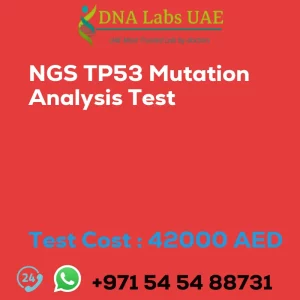Endocrine Cancer Gene Panel Test
Test Name: Endocrine Cancer Gene Panel Test
Components: EDTA Vacutainer (3 ml)
Price: 7200.0 AED
Sample Condition: Peripheral blood
Report Delivery: 4-6 weeks
Method: NGS
Test Type: Genetics
Doctor: General Physician
Test Department:
Pre Test Information: Endocrine Cancer Gene Panel can be done with a Doctors prescription. Prescription is not applicable for surgery and pregnancy cases or people planning to travel abroad.
Test Details
The Endocrine Cancer Gene Panel is a genetic test that analyzes a specific set of genes associated with endocrine cancers. These cancers include thyroid cancer, parathyroid cancer, adrenal gland cancer, pancreatic neuroendocrine tumors, and pituitary tumors. The panel typically includes the analysis of genes such as RET, PTEN, SDHB, SDHD, VHL, MEN1, MAX, and others, depending on the specific laboratory performing the test. These genes are known to be involved in the development and progression of endocrine cancers.
The Endocrine Cancer Gene Panel can help identify genetic mutations or alterations that may increase a person’s risk of developing endocrine cancer. It can also help guide treatment decisions and inform family members of their potential risk for the disease. The test is typically performed on a blood or saliva sample and may be recommended for individuals with a personal or family history of endocrine cancer, as well as those with certain clinical features suggestive of a genetic predisposition to the disease.
| Test Name | Endocrine Cancer Gene Panel Test |
|---|---|
| Components | EDTA Vacutainer (3 ml) |
| Price | 7200.0 AED |
| Sample Condition | Peripheral blood |
| Report Delivery | 4-6 weeks |
| Method | NGS |
| Test type | Genetics |
| Doctor | General Physician |
| Test Department: | |
| Pre Test Information | Endocrine Cancer Gene Panel can be done with a Doctors prescription. Prescription is not applicable for surgery and pregnancy cases or people planing to travel abroad. |
| Test Details |
The Endocrine Cancer Gene Panel is a genetic test that analyzes a specific set of genes associated with endocrine cancers. These cancers include thyroid cancer, parathyroid cancer, adrenal gland cancer, pancreatic neuroendocrine tumors, and pituitary tumors. The panel typically includes the analysis of genes such as RET, PTEN, SDHB, SDHD, VHL, MEN1, MAX, and others, depending on the specific laboratory performing the test. These genes are known to be involved in the development and progression of endocrine cancers. The Endocrine Cancer Gene Panel can help identify genetic mutations or alterations that may increase a person’s risk of developing endocrine cancer. It can also help guide treatment decisions and inform family members of their potential risk for the disease. The test is typically performed on a blood or saliva sample and may be recommended for individuals with a personal or family history of endocrine cancer, as well as those with certain clinical features suggestive of a genetic predisposition to the disease. |







